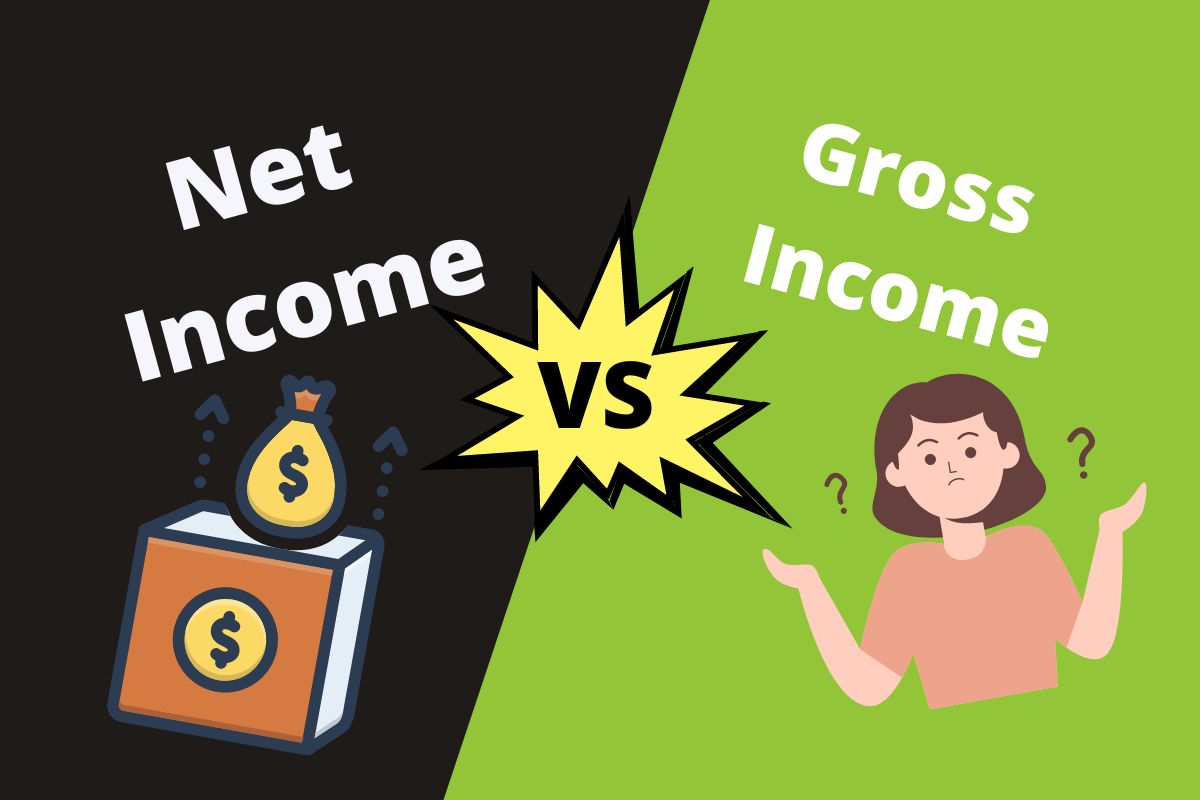Gross income means the total sum you receive from some activity, like salary, profit, income, etc., without any deductions. But net income is the remaining amount after clearing all dues like taxes, charges, expenses, etc.
Table of Contents
Net vs Gross Income
| Net Income | vs | Gross Income |
| This is the profitable amount individuals or businesses are left with after deducting all the expenses | Definition | Gross income is the annual salary or the amount you earn in a financial year with pretax deductions |
| Net profit, net earnings, net revenue, net profit margin, or bottom line | Other terms | Gross revenue, gross earnings, gross revenue, gross profit margin, gross pay, or top line |
| The amount you get to keep | Represents | The amount you make |
| Low | Amount | High |
| Net income is dependent on gross earning | Dependency | Gross income is not dependent on net earning |
| Provident fund, retirement contributions, and additional personal savings | Components | All operating expenses, house and other allowances, taxes, and more |
| Net revenue is the sales revenue amount after all the returns and refunds are made | Revenue | Gross revenue is the entire sales revenue from all the sources before any returns or refunds. |
| Net profit is calculated by excluding the taxes, penalties, EMIs, and other allowances | Calculated by | Gross revenue is calculated by adding the entire amount employers make |
| Net profit= gross income – all the allowances or wages | Calculation formula | Gross income= total income + all the allowances or wages |
What is Net Income?
The net income is the remaining profit or amount of money after you clear all your dues.
It’s also known as take-home pay because you are not supposed to pay any more deductions from this amount. Net income is a smaller number compared to gross income.
Net Income Examples
You own a food business, and after paying all the dues, you have $35,000 remaining. That’s your net income.
Suppose you set up a cookie store in your neighborhood street. You bought flour, chocolate chips, oil, and other stuff worth $20. You decide to sell one cookie for $2, and you sell 20 cookies worth $40.
After deducting your expenses ($20), you get a net income of $20. $20 is what you get to take home, and it is your profit margin.
We can also call net income the net profit since it is the amount you are left with after paying all payroll taxes and similar expenses.

What is Gross Income?
Gross income is the total amount of taxable income you take home without paying your income tax, bills, and other expenses.
Your gross income is a more considerable amount compared to the net income. For example, if you own food business and you make $200,000 a year without paying any wages or taxes, that $200,000 is your gross income.

Net vs Gross Income – Key Differences
Amount
The gross amount is the maximum amount business owners, or salaried employees receive. The net amount is less than the gross amount because it is what you receive after paying all dues.
Components
Gross income components include all dues like- house allowances, health insurance, medicare taxes, other insurance premiums, bills, etc. But the parts of net income include pension, provident fund, personal savings, etc. In short, there are lesser deductions in net income than in gross income.
Mode of Calculations
Employees collect the gross amount, including all payments, but net income is calculated by excluding taxes and penalties.
Gross income is calculated as basic salary + all the dues and allowances. In contrast, net income is calculated as gross salary – applicable allowances.
Impact on Your Budget
Your net income is mainly dependent on your gross income.
The higher your total revenue, the higher your liabilities will be. You should set your expense limitations based on your gross income, as you must earn enough to pay all the bills.
The gross margin also decides how you invest money. Some companies offer retirement plans where you can contribute a particular monthly sum by deducting it from your monthly paycheck.
Tax Considerations
Some of these contributions are pretax, which gives you the advantage of saving for retirement while reducing your tax liabilities. For example, if your salary is $50,000 and you decide to pay 4% of it to your retirement fund (pretax), you don’t need to pay taxes for this 4%.
Net Income Reflects Financial Health
Remember that net income is the take-home pay under which you decide your monthly budget. You use this money for necessities like groceries, house rent, car mortgages, etc.
Your net income reflects your financial health. After you spend on all your necessary expenses, the remaining sum is called discretionary income, which you can use for savings, investments, travel, and other self-indulgences.
If you’ve enjoyed this article, check out our post on revenue versus profit.

